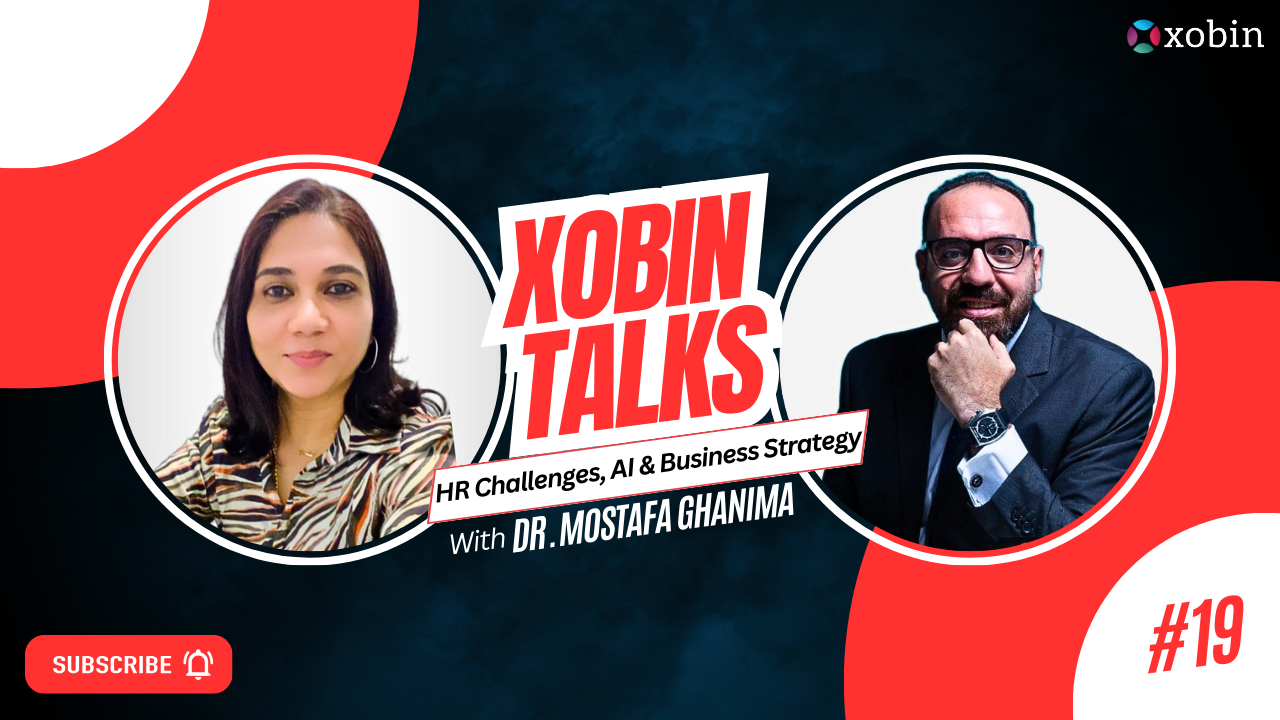Welcome to Xobin Talk 3.0 – Episode 19! We’re thrilled to bring fresh insights on HR challenges, AI, and business strategy in this episode. In Xobin Talks, we invite industry experts and researchers from the HR tech and talent acquisition space to share their knowledge. These thought leaders share their expertise to help HR teams and organizations excel.
Table of Contents
This time, we had the honor of speaking with Dr. Mustafa Ahmed Ghanima – CHRO Certified, Global Executives Certified, PHD. He is a renowned HR leader with over a decade of experience. His inspiring journey, from a humble start in a call center in Egypt to becoming the Group Total Rewards Director at Saudi German Health, is a testament to passion, resilience, and continuous learning. Dr. Mustafa shared his insights into HR’s complexities and how professionals in this field can leverage technology to enhance their effectiveness.
Let’s dive into the episode as Dr. Mustafa shares his experiences, offers practical tips, and inspires HR professionals with his wisdom in this engaging Xobin Talk—an HR podcast!
Mustafa’s Journey: From Call Center Agent to HR Leader
Dr. Mustafa’s story began unexpectedly. He started his career as a call center agent in Egypt. Although unrelated to HR, that initial role sparked his interest in the field. Like many, Dr. Mustafa initially thought HR was simply the “discipline department” of an organization. However, his curiosity about HR grew, pushing him to explore it further.
Dr. Mustafa recalls, “I questioned the HR team about what they did, and they said they handled discipline.” This answer intrigued him so much that he applied for an HR position internally despite being told he wasn’t qualified. Driven by passion, Dr. Mustafa took a major leap. He accepted a significant pay cut to transition from a senior call center position to an HR data entry role.
“I lost about 80% of my salary to start my HR career,” he mentioned. But the positive atmosphere and his deep passion for the field kept him going. Dr. Mustafa completed his MBA in Human Resources while working, eventually becoming an HR specialist at a prominent retail company. His dedication didn’t stop there. He gained experience in multinational companies, worked in the UK for a year, and now serves as the Group Total Rewards Director at Saudi German Health.
Reflecting on his journey, Dr. Mustafa says, “People are passionate about something, it shows in their journey.” His story reminds us of The Alchemist, where pursuing one’s dreams leads to profound fulfillment. His rise in HR reflects a combination of passion and determination.
Passion for People: The Balancing Act in HR
A central theme in Dr. Mustafa’s journey is his love for working with people. When he was asked what initially attracted him to HR. He answered, “Dealing with people is what I love most.” With a background in law, he found himself balancing employee rights with the company’s objectives. According to him, HR is about finding that sweet spot between the two.
HR is more than just managing people, as Dr. Mustafa discovered when he moved into top HR positions. The goal is to strike a balance between company objectives and employee satisfaction. Occasionally, he clarified, “HR feels like the lowest position in an organization.” We must, however, strike a balance between a company’s interests and its employees’ rights. The company is not a charity in the end. His experiences show the significance of human resources management in aligning employee interests with organizational objectives.
The biggest challenge, he admits, lies in hiring. He recalled when management wanted to fill a factory manager position at a below-market salary. The result? Underperformance and financial losses. “I’ve learned that hiring at market rates is essential for achieving organizational goals,” he added.
Navigating the Hiring Challenges
Finding the right talent in today’s competitive job market can feel like finding a needle in a haystack. Dr. Mustafa emphasized the importance of market analysis and data-driven decisions in recruitment. “I always provide data to support our hiring strategies. We need to know where the organization wants to position itself in the market,” he said. This rational approach helps ensure that hiring aligns with strategic goals.
He also stressed that hiring must be thorough and blend technology with human insight. While Applicant Tracking Systems (ATS) can filter resumes based on keywords, Dr. Mustafa pointed out that they often need to evaluate true capabilities. “An online ATS system can’t verify the accuracy of what candidates claim on their resumes,” he noted. He advocates using online assessments to validate skills to counter this, ensuring more reliable hiring decisions.
The Intersection of HR and Business
Dr. Mustafa’s approach to HR goes beyond managing people; it’s deeply intertwined with business strategy. He uses market data to guide salary discussions, ensuring his organization stays competitive when attracting talent. “We need to position ourselves in the first quartile, median, or third quartile of market salaries,” he explained.
HR professionals are increasingly seen as strategic partners, not just administrative support. Dr. Mustafa shows that HR can play a crucial role in shaping business strategy by understanding market trends and making data-driven decisions. His ability to make the business case for HR decisions reflects a growing trend in the industry.
The Role of Data and Analysis in HR
In today’s world, data is king. Dr. Mustafa’s data-driven approach to HR is transparent in his analysis of salary structures. He uses quartile analysis to determine where his organization should position itself in the market. “If we want the best talent, we need to offer competitive salaries,” he stated. His approach helps in recruitment and aligns HR strategy with overall business goals.
Understanding market trends and leveraging data allows HR professionals to make smarter decisions, contributing to long-term success. Dr. Mustafa’s insights highlight the importance of incorporating analytical approaches into HR practices.
The Impact of Technology on HR
During the podcast, the conversation shifted to how technology is transforming HR. Dr. Mustafa acknowledged that traditional hiring methods, focused on resumes and interviews, are being reshaped by Artificial Intelligence (AI). He stated that AI is significantly influencing HR through process simplification and insightful analysis.
For instance, ATS systems sift through thousands of resumes, identifying candidates that meet specific criteria. However, Dr. Mustafa warned against over-reliance on these tools. “AI can scan resumes for keywords, but it can’t confirm if a candidate’s claims are true,” he explained. He advocates a hybrid approach, combining AI with human judgment to ensure better hiring outcomes.
He also touched on the emergence of AI-powered video interviews. These tools can analyze body language and evaluate the content of candidates’ answers. “AI provides insights into how candidates answer questions, making it easier to assess their knowledge and suitability for the role,” he noted. This technology-driven approach enhances the hiring process, reducing risks associated with recruitment.
The Shift to Assessment-Based Hiring
While technology has made strides in improving hiring efficiency, Dr. Mustafa highlights the importance of validation through assessments. “ATS systems often pick resumes based solely on keywords, which can lead to qualified candidates being overlooked,” he explains. This limitation has led to a growing emphasis on online assessments to evaluate candidates’ accurate skills.
“Silent validation through assessments allows us to understand the real capabilities of candidates,” Mustafa says. By incorporating skill tests into the recruitment process, HR can better understand a candidate’s qualifications beyond what is written on their resume. Moreover, subjective-based video interviews with AI analysis can provide deeper insights into a candidate’s knowledge and communication skills. This multifaceted approach to hiring helps organizations select candidates who fit the role and align with the company’s culture and values.
The Human Element in HR
Despite technological advancements, Dr. Mustafa emphasized the irreplaceable human element in HR. “Technology can streamline processes, but it can’t replace the value of an HR professional,” he said. The core of HR lies in understanding people, building relationships, and fostering a positive workplace culture.
Dr. Mustafa notes the significant impact of AI on recruitment processes. “AI can simplify recruitment by screening resumes and handling initial interviews,” he explains. However, he stresses that AI should be seen as a tool to enhance HR practices rather than a replacement for human intuition and empathy.
“AI can help identify the right candidates faster, but it lacks the human touch necessary for understanding cultural fit and nuanced communication,” he adds. For Dr. Mustafa, the future of HR lies in leveraging technology to augment the decision-making process, allowing HR professionals to focus more on strategic aspects of their roles.
He believes AI can enhance HR but can never fully replicate human interaction. “Only humans can read body language, interpret emotional signs, and form sincere bonds, he said. As AI evolves, HR professionals must use it to augment their abilities, not replace them.
The Future of HR: Upskilling and Adaptation
As our conversation drew to a close, Dr. Mustafa reflected on the future of HR. He envisions HR professionals using technology and actively shaping how it integrates into the workplace. “He asserted that organizations are now upskilling their employees to use AI products efficiently. Continuous learning and adaptation will be essential in an era of rapid technological change. HR professionals need to stay ahead by learning new tools and approaches. As Dr. Mustafa pointed out, those who embrace technology while maintaining the human touch will drive the future of HR.
Conclusion
Dr. Mustafa’s journey from a call center agent to Group Total Rewards Director is inspiring. His passion, persistence, and strategic thinking have paved the way for a successful HR career. Through his insights, we see that the future of HR lies in balancing technology with the human element. As HR professionals continue to navigate workforce management challenges, they must embrace technology while nurturing human relationships. This delicate balance will drive organizational success and foster a culture where employees thrive. By leveraging technology wisely, HR can align employee satisfaction with business goals, ensuring long-term success for the organization.






